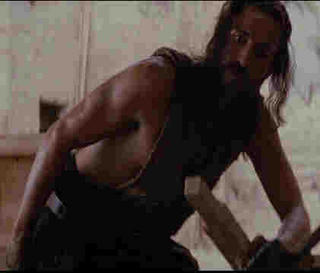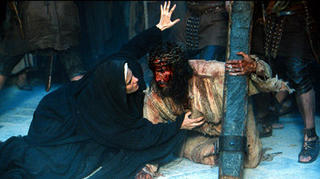Why Did Jesus Die?
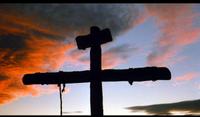
So where were all the guys on Sunday? They all bailed on me. Oh well, me and the girls had an okay time discussing "Why did Jesus Die?" Hopefully we'll have a better turn-out next week.
Last week we talked about who Jesus is. This week we're going to talk about why He died, why Mel Gibson would focus on why and how He died rather than the rest of the Gospel, and how His death is God's way of giving us the grace of salvation. We'll talk about the New Covenant that is established by His death, and how the Eucharist that the Mass offers each week is the sign and renewal of that covenant. We'll also look at suffering in our own lives and wrestle with the question of how a loving God permits suffering.
Why did Jesus die?
Humanly speaking, there are a number of reasons why the people in Israel might have wanted Jesus dead. Some people hated their occupation by the Romans, and eagerly awaited the Messiah, who would set them free from the rule of Rome, like Moses had led their ancestors out of Egypt. When Jesus came, many flocked to Him, expecting Him to be that kind of leader. Many scholars think that's why Judas Iscariot joined up with Jesus' band. But when Jesus didn't drive out the Romans, and seemed more concerned about a "spiritual" kingdom than national Israel, Judas turned on Jesus, and betrayed Him to His other enemies, the Jewish religious leaders.
To these people (The Jewish religious leaders), it looked like Jesus was a controversial wandering preacher, stirring up trouble and getting on the wrong side of the religious elite. He made such a nuisance of Himself that they finally did away with Him. The things that He taught about Himself, and about God, and about how to serve Him, would certainly give them something to charge Him with. After all, in Jewish society, for someone to claim to be the Messiah, and more, to be God Himself, was pretty serious stuff.
This is why the Jewish leaders wanted to kill Him, and at His trial, they charged Him with "blasphemy" and the High Priest tears his robes as a sign of ultimate distress(Clip 1: 0:27:45-0:28:20). Blasphemy is "directly opposed to the 2nd Commandment. It consists in uttering against God--inwardly or outwardly--words of hatred, reproach, or defiance; in speaking ill of God; in failing in respect toward [Him] in one's speech; in misusing God's name," according to the Catechism of the Catholic Church (2148).
The penalty for blaspheming God's name is written in the book of Leviticus: Death by stoning (Lev 24:16). This law was written during the time of Moses when some Israelites were worshipping a golden calf instead of recognising the true God who had miraculously led them out of Egypt.
Because of the Roman occupation, though, the Jews weren't allowed to kill Jesus themselves, and that was why they brought Him to Pilate to be crucified. Pilate decided to let them kill Jesus because he feared another revolt. The Jewish people were rather unruly as far as the pagan Romans were concerned. Pilate was trying to cool a boiling pot of unrest, and not doing too well at it. The Jewish authorities trapped Pilate into a predicament, and Pilate took the coward's way out, and instead of releasing an innocent Man, he had Him cruelly beaten and then crucified. Mel Gibson establishes a contrast between Pilate's act of washing his hands of his responsibility and Jesus purifying His hands at the Last Supper (Clip 2: 1:08:06-1:12:27).
To "wash one's hands" of responsibility for something is a popular expression in our culture that comes directly from this historical incident. Pilate "washes his hands" of Jesus' imminent crucifixion to show that, in his mind, he bears no responsibility for it (Matthew 27:24). In this symbolic act, Pilate says that he has tried to do what is right and have Jesus released, but the Temple authorities and the crowd would not allow him. Now he's done with the matter. Whatever happens is not his fault. The contrast points to the crucial difference between God washing away our sins, and our own fruitless attempts to absolve us from our responsibility. In the Mass, before the priest offers up the gifts, he washes his hands and asks that God would wash away his sins, which is taken from this practice at the Passover. It is only God who can wash away our sins. Merely denying our responsibility in the matter does not make us innocent any more than Pilate can be excused for his role in Jesus' crucifixion.
This note on sin brings us to the real reason for Christ's death, for beyond being about someone's execution, or even the execution of an innocent man, as we discussed last week, The Passion is about the Crucifixion of the God-Man. Jesus Christ was God Himself, and as such had the power to stop His death at any time--and yet, He chose not to. In fact, it was the very reason He became a man. The real reason Jesus was put to death, whatever reasons the people involved had for killing Him, was to pay the penalty for our sins and bring us healing (Clip 3: 0:00:18-0:00:28).

(Clip 4: 0:05:00-0:6:43): The Devil's question to Jesus, "Do you really believe one man can bear the full burden of sin?" establishes the whole premise of the movie--the very meaning of Jesus' suffering and death, which, as God, He had the power to avoid. Jesus would offer Himself as the spotless (i.e., sinless) Lamb of God to be sacrificed for the atonement of the sins of humanity.
Jesus' death is the consequence of our sin, because in sinning, we turn our backs on God, the Source of our life. Each one of your sins, each one of my sins, put Jesus on that cross. Mel Gibson dramatically represents this truth by being the one in the movie who hammers the nail into Jesus' hand (Clip 5: 1:36:37-1:36:42). Jesus took the consequences of our sin--death--in our place.
Some people look at that explanation and wonder how such a "loving" God could require Jesus to take upon Himself such tremendous suffering. This makes God seems like a harsh, overbearing Father who requires the suffering of His innocent Son. But this is not the case. Human beings used their free will to build a wall between themselves and God through centuries of pride, disobedience, and selfishness beginning with Adam and Eve. Jesus, who was God Himself, freely came into the world as a man to perform an act of such intense humility, obedience, and love, that it would obliterate the wall (Clip 6: 1:30:57-1:31:21). The forces of human sin and demonic fury collaborated to hurl at Jesus every possible punishment and torture to turn Him from His mission. But in so doing, they unwittingly proved the perfection of His love and provided Jesus with the cross, the very instrument of salvation.
This is why Jesus remained on the cross, even though the Jewish leaders taunted Him by claiming that if He came down that they would believe in Him. If Jesus had come down from the cross, He would have nullified the very reason for His coming into the world--to save us from our sins and make eternal life in heaven possible for us. He needed to remain on the cross until death in order to offer the sacrificial atonement required to reconcile us with God and break our bondage to sin.
(Clip 7: 1:51:25-1:51:32): When Jesus says, "It is accomplished," He is announcing that His Passion is now complete. He has completed the mission for which He came into the world, namely to save humanity from its sins, to win back that which had been lost. The redemption of man has been accomplished. All men and women now have the opportunity to receive eternal life if they accept His grace and remain faithful until the end.
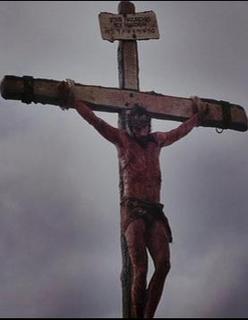
As horrific as Jesus' death was, we need to appreciate a fundamental truth of human existence: authentic love involves sacrifice. Love involves the total giving of self. Love can even mean "[laying] down one's life for one's friends" (Clip 8: 1:35:00-1:35:23). So there is a transcendent meaning in sacrifice and suffering. If endured for the good of others, it is truly sanctifying and salvific. To a world that tries to avoid discomfort of any sort, this seems ridiculous. Instead, it is just one of countless examples of how the way of Truth runs counter to human expectations. This, by the way, has always been the case. The first people to hear the story of Jesus were just as struck as we are today at the strangeness of it. St. Paul wrote 2000 years ago, "For the message of the cross is foolishness to those who are perishing, but to us who are being saved, it is the power of God" (1 Corinthians 1:18).
Couldn't God have just declared us forgiven?
Why did God choose such a painful and bloody way to forgive us? If He is all-powerful and loving, couldn't He have just forgiven us, and not worried about the crucifixion of Jesus? In suffering, we actually come to understand more about God's unfathomable love. The idea that God reveals His love for us through the Passion and Death of Christ is stated clearly in the Bible when Jesus (after His resurrection) reveals to His disciples: "Was it not necessary that the Christ should suffer these things and enter into His glory?" (Luke 24:26). Why was suffering necessary? To restore to us what the original humans (Adam and Eve) had lost through disobedience. In their disobedience, they sinned against God's law and began to love themselves and other things more than they loved God--who should be first in every person's heart. They lost the privilege of life with God, and when they lost it, they lost it for us as well.
Love involves self-giving, the sacrificing of our selfish desires for the good of another. After the Fall, human desires became self-seeking and disordered. Christ's redemption for us--His taking on of the burden of sin--not only restored our relationship with God, but also taught us the true meaning of love: sacrifice (Clip 9: 1:12:55-1:13:12). In short, words are cheap. It is through actions that we prove our love. To understand suffering for love is to understand God. To understand God is to understand life.

This also provides a key to understanding where God is in suffering. He is not distant or aloof, but He Himself came and suffered with us.
He understands the pain we go through as a result of sin. But He also gives us the ability to use our own sufferings for redemptive purposes, by uniting our pain with that of Jesus, as St. Paul talks about in Colossians 1:24: "Now I rejoice in my suffering for your sake, and in my flesh I am filling up what is lacking in the afflictions of Christ on behalf of His body, which is the Church". God allows us to offer our sufferings to Him in order to participate in our atonement.We want fatherly assurance that there is an order to our painful reality that somehow transcends our problems....This is our cry when we ask "why?" The problem of suffering is not about something; it's about someone. And so it follows that the answer is not something, but someone. And God, like any good daddy, doesn't give answers as much as He gives Himself...
I learned early on in this wheelchair that God owed me no explanations. He did enough explaining on the cross. He didn't provide me with the words I was looking for at the beginning of my paralysis. Instead, He is the Word. The Word made flesh, hands nearly ripped off, nailed to a cross, vomit, spit, smeared, dried blood, hammering hatred, flies buzzing....For one who suffers, I'm so glad Jesus endured a messy death on the cross. I'm so grateful that our God isn't a medicating mystic of a guru who sits on some mountaintop twiddling his thumbs, but is our Saviour who suffered a messy, bloody death that was excruciatingly painful at the hands of vindictive and mean-spirited men.
God allows suffering so that nothing stands between Him and me. You see, when we suffer, we're much more apt to fall on our knees, and when we do, our hearts are open to the Lord. (Joni Eareckson Tada)
Since God is holy and completely righteous, He cannot pass over sin as a small thing. He cannot simply shrug it off. Satisfaction must be made. A proper penalty must be paid, and according to Romans 6:23, that penalty is death. But the same God who is holy and righteous, and whose divine wrath burns toward sin, is also the God of infinite love. It is His love that brings us back to the cross. The cross is the atonement for our sins, bringing restitution and reconciliation through the blood of Christ. This is why Mel Gibson has the scene where Mary cleans up the blood of Christ spilled at His scourging (Clip 10: 1:04:30-1:05:04). By this representation of devotion to the precious blood of Christ, we see that Mary, as a mother, demonstrates more than just a maternal love for her Son; she shows her understanding of the sacredness of His blood. Like the Old Testament sacrificial system, which was a type of Christ's sacrifice, it is His blood that covers sin and washes the sinner clean. God gave the blood, which is life, for the atonement of sins, and without blood there is no remission of sins (Lev. 17:11; Heb. 9:22). Through His blood, Jesus establishes His New Covenant with humanity (Clip 11: 1:18:27-1:18:47), where Jesus meets Mary on the road, and He rises up, saying, "See, I make all things new!" This line is from the Revelation to St. John, and there it is describing the newness of the World at the End, recreated by Christ. Here, it points to the truth that the New World was begun by Christ on the Cross with the New Covenant).
What is the Covenant?
When God led the Israelites out of Egypt, He made a covenant with them, saying that He would be their God, and they would be His people. This event, which occurred about 1200 years before the birth of Jesus, is key to understanding Christ's Passion, because the Passion is the fulfilment of the Jewish Passover ritual.
As Scripture tells us, the night the Hebrews were set free from slavery in Egypt, God sent the angel of death to claim the first-born of every household. The Lord promised, however, that death would "pass over" His chosen people if they put the blood of a lamb on their doorposts. The blood would save them (Ex 11-12). This event began the relationship of God with the Jewish people, and is the most celebrated and written about event in their history. It defines their faith. After more than 1000 years of the Jewish people commemorating this saving event of Passover, Jesus came as the ultimate Passover offering and revealed its true meaning: by the shedding of His blood--the blood of the spotless, sinless Lamb of God--sin and death are finally conquered; they no longer have power over us.
The Passover event of Exodus is a foreshadowing of Christ's death on the cross. The blood of Jesus, the perfect "Lamb" of God, would be sprinkled on the cross (the doorpost) for His followers. Christ's blood will save all who accept Him and keep His commandments; death "passes over" them, for they have eternal life. That is exactly why Jesus began His own Passion by celebrating the Passover with His disciples and transforming it into the Eucharist, the meal in which we now receive His Body under the form of bread and the cup of His Blood under the form of wine, which saves us from eternal death.
The blood is the key to understanding the sacrifice of the Lamb--Jesus, who takes away the sins of the world. Just as blood is shed by soldiers who lay down their lives for their country or by mothers in childbirth, sacrificial love often involves the shedding of blood. It is no coincidence that the Passion of Christ took place precisely at the time of the Jewish Passover (Clip 12: 0:14:07-0:14:40). Mary asks the question that at every Passover is asked by the youngest child at the table: "What makes this night different from every other?" The response, given by Mary Magdalen is, "Because once we were slaves, and now we are slaves no longer." This question and answer are the traditional lines when celebrating the Passover, in order to reflect on its meaning. Here, they are given new meaning as they are applied to Jesus. It is only one of many fulfilments of Old Testament Prophecy and is fundamental to understanding God's actions throughout history to save the human race.
This is why Mel Gibson flashes back so often to the Last Supper during the scenes where Jesus is being crucified. The way Jesus celebrated the Passover meal (i.e., the Last Supper) with His apostles was meant to fulfil the Old Covenant. He declared that the Passover bread was His own body and the wine was His blood. He required that this new ritual be practised in memory of Him. We know this today as the Eucharist or Holy Communion.
Jesus' teaching on this subject of being the fulfilment of the Passover, that He was the Lamb whose flesh would be given for our eternal life, didn't start at the Last Supper. All through John's Gospel, Jesus is referred to as the Lamb of God, and in John chapter 6, there is a lengthy discussion on how He will give His flesh to be eaten and His blood to be drank. He calls Himself "the Bread of Life." This teaching caused many to turn away from Him, and in the movie, Mel Gibson brings that charge against Him at His trial (Clip 13: 0:25:45-0:26:00).
Jesus meant what He said literally, that He really was going to give His flesh and blood as our spiritual food and drink. In fact, He was so serious about it, that He said that if we eat His flesh and blood, we will have eternal life, but if we do not, we have no life in us! This food, however, would come to us in the humble form of bread and wine. This is what Jesus was doing at the Last Supper, when He called the bread His body, and the wine His blood. He literally transformed the food into His body and blood so that we could eat Him.
At first hearing, this teaching sounds strange, but when we understand the background, it makes more sense. If you've seen The 10 Commandments or Prince of Egypt--or actually read Exodus!--you might remember that the Passover was celebrated because God sent His angel of death during the time of the 10 Plagues to kill the firstborn children in the land of Egypt, but he would "pass over" the homes that had the blood of a lamb on the doorposts. What is not commonly known, however, is that the families who killed the lamb and then sprinkled the lamb's blood also were told to eat the lamb. In order to complete the Passover sacrifice, they had to eat the lamb that was slain.
Jesus is the perfect Lamb. In order to share fully in His sacrifice on the cross, Christians are called to feed on the Lamb of God who is the Bread of Life. Thus, the Last Supper is not some separate event from the Crucifixion, but one and the same event, from beginning to end. Christ's sacrifice began at that meal and continued to the point of His death. This truth is demonstrated in the movie by Gibson's flashing back to the Supper.
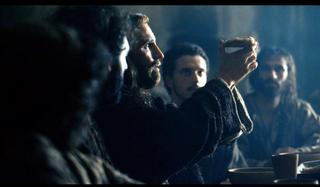 (Clip 14: 1:34:00-1:34:32 / Clip 15: 1:40:40-1:42:05 / Clip 16: 1:42:30-1:43:10) He established a New Covenant with us, and through His death and resurrection, through Baptism and the Eucharist, we enter that Covenant, and are God's beloved people!
(Clip 14: 1:34:00-1:34:32 / Clip 15: 1:40:40-1:42:05 / Clip 16: 1:42:30-1:43:10) He established a New Covenant with us, and through His death and resurrection, through Baptism and the Eucharist, we enter that Covenant, and are God's beloved people!The once-and-for-all sacrifice of His body on the cross is "re-presented" tangibly every Mass by the sacrifice on the altar, the bread and wine that become His Body and Blood. In the book of Revelation, Jesus is presented on the Throne as a slain Lamb, and John tells us this to show us that Jesus' sacrifice on the cross is eternal and from a heavenly perspective, is still happening. When we partake of His Body and Blood in the Eucharist, we are uniting ourselves to that sacrifice. In a sense, at Mass, heaven and earth meet and we are in God's throne room! In the Jewish religion, their Temple had two main areas: The Holy Place, where the people would worship, and the Holy of Holies, which was where the presence of God dwelt. No one could go in there, except the High Priest, and he could only go once a year to make sacrifices.
When Jesus died, He, who is our true High Priest, and our true sacrifice, opened the way for us to come into the Presence of God. The Gospels tell us that at His death, the veil in the Temple that separated us from God was torn in two from top to bottom (Clip 17: 1:53:18-1:53:23). The book of Hebrews tells us that because of this, we have access to God at any time. In the Mass, we experience the ultimate fulfilment of that promise, because we're not merely entering the holy of holies of an earthly Temple, but are actually in the Presence of Christ as Heaven touches Earth! This is why Jesus died, so we could enter into God's presence as His Covenant people, His sons and daughters!
Think through some of these questions:
-Have you thought about being in Covenant with God? What does that mean to you?
-What do you think when you hear that heaven and earth meet at Mass?
-What about all that suffering in the world? Does Jesus' suffering indicate that your own suffering has a higher purpose? Does the fact that Jesus suffered help you realise that He understands you and knows what you're going through?
At the end of time, billions of people were scattered on a great plain before God's throne.
Most shrank back from the brilliant light before them. But some groups near the front talked heatedly--not with cringing shame, but with belligerence.
'Can God judge us? How can he know about suffering?' snapped a pert young brunette. She ripped open a sleeve to reveal a tattooed number from a concentration camp. 'We endured terror...beatings...torture...death!'
In another group a Negro boy lowered his collar. 'What about this?' he demanded, showing and ugly rope burn. 'Lynched...for no crime but being black!'
In another crowd, a pregnant schoolgirl with sullen eyes. 'Why should I suffer,' she murmured, 'It wasn't my fault.'
Far out across the plain there were hundreds of such groups. Each had a complaint against God for the evil and suffering he permitted in his world. How lucky God was to live in heaven where all was sweetness and light, where there was no weeping or fear, no hunger or hatred. What did God know of all that man had been forced to endure in this world? For God leads a pretty sheltered life, they said.
So each of these groups sent forth their leader, chosen because he had suffered the most. A Jew, a Negro, a person from Hiroshima, a horribly deformed arthritic, a thalidomide child. In the centre of the plain they consulted with each other. At last they were ready to present their case. It was rather clever.
Before God could be qualified to be their judge, he must endure what they had endured. Their decision was that God should be sentenced to live on earth--as a man!
'Let him be born a Jew. Let the legitimacy of his birth be doubted. Give him a work so difficult that even his family will think him out of his mind when he tries to do it. Let him be betrayed by his closest friends. Let him face false charges, be tried by a prejudiced jury and convicted by a cowardly judge. Let him be tortured.
'At the last, let him see what it means to be terribly alone. Then let him die. Let him die so that there can be no doubt that he died. Let there be a great host of witnesses to verify it.'
As each leader announced his portion of the sentence, loud murmurs of approval went up from the throng of people assembled.
And when the last had finished pronouncing sentence, there was a long silence. No-one uttered another word. No-one moved. For suddenly all knew that God had already served his sentence.
--The Long Silence quoted from The Cross of Christ, by John Stott.
God bless!
Labels: Crucifixion, Eucharist, Jesus, St. Andrew's, The Passion of the Christ

